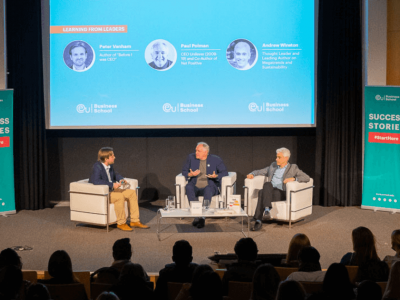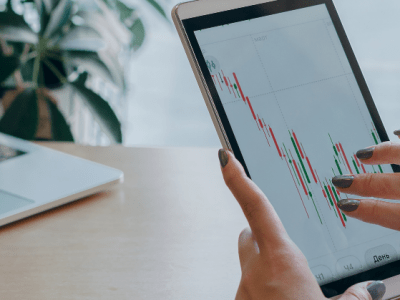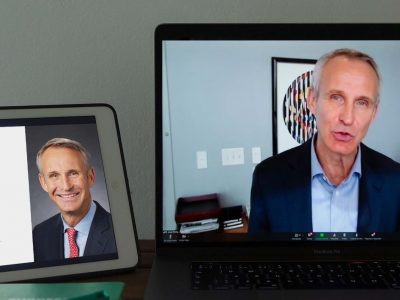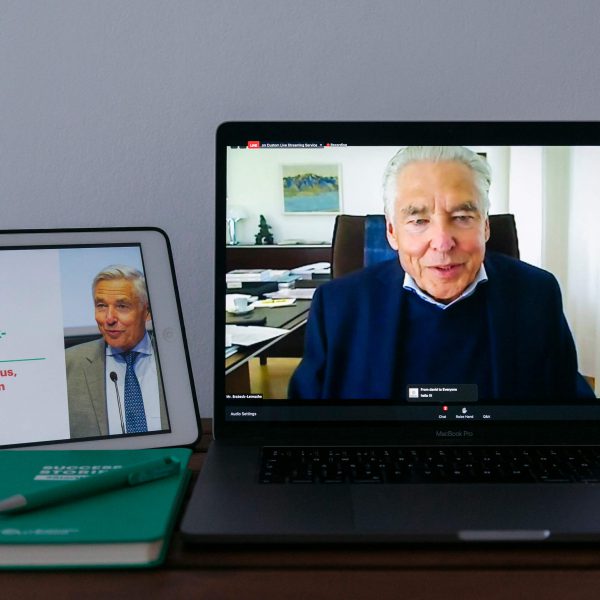Insights From Daan Struyven, Senior Economist at Goldman Sachs
Economies around the world are beginning to wake up after the restrictions imposed by the global health crisis. With so many possibilities before us, we were delighted to have the opportunity to hear from Daan Struyven at our exclusive Learning From Leaders conference. A Senior Economist at Goldman Sachs, Daan is perfectly placed to share an informed opinion of what the economy of tomorrow will look like.
Daan joined us from New York to have a virtual conversation with Peter Vanham, author of “Before I Was CEO”, to discuss his career, advice for students, and what he’s learnt about the future of our global economy from research conducted in his work at Goldman Sachs.
It was an active session with lots of participation and perceptive questions from EU students who tuned in from around the world. The full event can be watched here. In this blog, we’ve collected some of the highlights from this far-reaching and fascinating conversation.
Future Gazing: A Macroeconomic Forecast
One key question put to Daan during the exclusive live conference was: what is the global economic situation, and what will the recession look like? Thankfully, his answer was optimistic.
“Global GDP fell extremely sharply, by about 17% between mid-January and mid-April. Based on the historical data that we have, this is the deepest global recession we’ve seen since at least the Second World War. However, if you define a recession as a period where activity is declining, where output is falling, this recession may already be over in the sense that the recovery has started. In fact, we estimate that about half of this 17% decline that we saw at the peak has now been unwound as many economies reopen.”
Daan went on to explain that we are also in a better shape than when the financial crash of 2008 hit. Coming into this recession households in the U.S. and elsewhere had healthy balance sheets, elevated saving rates and a relatively healthy overall financial situation. Banks also entered the crisis in a healthier position with capital buffers and better liquidity. This stronger starting point was complemented by strong support from governments and: “While there was a run on several banks during the previous financial crisis due to worry about the quality of their assets, this time around, in March and April, households ran towards banks […] The saving rate in April surged to an all-time high and a lot of banks saw an increased level of liquidity, as households brought their cash to banks rather than taking it away.”
The forecast shape of the recession seems similarly encouraging: “So far, the recovery in countries where the public health situation is under control has a lot of properties of a V, meaning a very sharp decline and a quick initial rebound. However, we expect that the pace of progress will slow, and it will probably look like something in between a V and perhaps more realistically a Nike swoosh, or a square root. Meaning that initially the pace of progress is fast, but afterwards you continue to make progress at a slower pace.”
He went on to explain: “The fundamental reason that the initial recovery has been fast is that policy support has been strong. Fiscal policy makers have provided a lot of disposable income through unemployment benefits and wage subsidies, to support households and to support consumption. And second, I think we are learning, and I think China has been leading the way, that in some sectors it is less challenging to bring activity back while controlling the virus. Think about manufacturing, think about commercial construction. In those sectors, if you adapt your work protocols, use masks, use social distancing, you can bring activity back quite quickly. However, there are sectors where this is much more difficult; travel, entertainment, sports events, that will be much harder and I think there, we are not going to go back to normal levels until we have a medical breakthrough. And so, the slower pace of that second group of sectors will cause the initial V to look much more like a Nike swoosh.”
Daan also emphasized the very elevated and mostly medical risks around the economic forecasts. On the downside, a large rise in infection rates could stall or even reverse the recovery and fiscal support could weaken. On the upside, a faster-than-expected arrival of vaccines or breakthrough treatments could lead to a faster recovery. But virus control itself will continue to remain the most important driver of the economic outlook in the coming quarters.
The lived experience of the recovery will of course differ significantly between developed and developing countries, for high- and low-income earners, and across different sectors. For example, 35-40% of work in the U.S.A. or Europe can and has been done at home, enabling productivity to continue throughout the pandemic. However, this mainly applies to higher income earners and white-collar professions. Anyone working or running a business in tourism, hospitality or elsewhere in the service sector has not had that luxury. Nevertheless, the broader picture remains hopeful.
Looking ahead, Daan identified two key trends that will remain present for at least the coming decade:
Firstly: “The strong role of fiscal policy and the comfort of fiscal policy-makers to respond aggressively. The global fiscal response has been around 10% of GDP in just a couple of months, whereas during the great financial crisis which lasted several years, the response was quite a bit smaller.”
Secondly: “Low interest rates. Interest rates were already low coming into this crisis, several countries had already adopted negative interest rates, think about Japan or the Euro area, but now the Fed [Federal Reserve Bank], the U.K. and lots of emerging markets have also brought their interest rates essentially to zero. As long as inflation remains weak and as long as unemployment rates remain elevated, there will be very large incentives for central banks to keep pushing, keep interest rates low and I do think that’s supportive of the economy. It has some quite significant effects on the real economy as well. When I look at housing sector data across the world it’s actually quite strong, and in many countries the level of real estate activity is now already back to, or above, the pre-corona-crisis level. That’s because housing, through mortgages, is relatively sensitive to low interest rates.”
Daan also predicted changing patterns of trade, impacted both by the impact of the virus on global supply chains, and by the ongoing US China trade war. However, he reassured attendees: “Diversification of supply chains in terms of trade does not necessarily mean that global trade volumes are going to go down. It could just mean that countries reorganize their flows, that new regional blocks emerge and that for instance, countries like Vietnam or Bangladesh could see a pick-up. But some decoupling and some diversification in terms of the US China relationship seems quite likely.” Helpfully, in response to an insightful question from Liu Yue, a Chinese student studying at EU’s Munich campus, Daan put the impact of the tense trade relationship between U.S.A. and China into perspective: at its peak, the impact of coronavirus on quarterly growth is about sixty times larger than the impact of the trade war. Daan’s tentative optimism suggests light at the end of the tunnel; there’s reason to hope that the situation between the two countries will only get better. Goldman Sachs’ position is that “it would be quite costly to re-escalate the trade war when the economic situation is tough”. A silver lining, perhaps?
Given this complex picture, it’s helpful to understand the role banks and the financial system will play in navigating the coming recession and forging a new normal to rebuild our global economy.
The Role of Financial Services in a Global Recession
Daan summarized the responsibility of the financial system: “The banks and monetary policy-makers and fiscal policy-makers are playing this crucial role in terms of the bridge between a relatively healthy starting point and the future.”

But what does that look like in practice? “I think conceptually the three most important roles for the financial system are, firstly, providing liquidity to households and firms when necessary and they have done that, together with governments and central banks. Second, is identifying the projects and companies that will be healthy and need strong support to get through this tough period, and that may become harder if indeed we are going to see some reallocation and structural declines in some sectors and structural increases in others. That is going to be a big challenge for financial markets and banks more broadly. And finally, I think the third role of the financial system is to help households to save in a smart and diversified way – I think this corona crisis has shown how quickly a crisis can move and how important it is for banks to help households to manage their savings in the best possible way.”
Again, there is a glimmer of optimism in Daan’s recognition that banks will play an important role in identifying and supporting households as well as businesses and sectors that were strong prior to the crisis, and that are highly likely to continue to be successful following economic recovery.
So, which industries look likely to thrive in the ‘new normal’?
Identifying Areas of Economic Growth
Daan identified several sectors which data shows are set to thrive during this period of recovery and renewal.
First and perhaps most obviously: “Society’s willingness to invest in public health and the public health system got a big boost and that’s I think here to stay”, Daan noted. Furthermore, digitalization, which has been accelerated by the impact of the coronavirus, has supported growth across e-commerce, home technology and home delivery for restaurants and other services.
Looking ahead, we need to consider how we will redesign the spaces we live in, where we work, how we commute… “Even if we were to get a vaccine or a major medical breakthrough, I do think that the focus of our society on being ready for viruses and infectious diseases is here to stay.”
The virus has caused what economists call an exogenous shock. In situations like these, Daan said, “it is very important to be creative and open minded about solutions”. Asked about proposed methods such as debt forgiveness and inverse mortgages, Daan explained that there are advantages and disadvantages to both which would need to be carefully weighed up considering the current context.
Advice for a Career in Economics and Banking
Daan offered several valuable pieces of advice to students entering a difficult job market.
For those interested in following in his footsteps, Daan outlined the core components of his role: “At the beginning, and it continues to be important, being highly analytical and careful with data and careful with the analysis is the most important part. Over time you evolve, and it becomes more important to figure out; what are the most important questions our clients want to know the answer to? You can get to those by reading, thinking, brainstorming, taking a step back, talking to people […] It also becomes quite important to lead a team, inspire them and speak to senior clients. And it is not rocket science, it is learning by doing and getting continuous feedback along the way.”
Daan also suggested cultural awareness and empathy are valuable in his role: “I work with clients across the world and I think it’s important to learn a bit about their background and try to understand them.” But gaining a cultural IQ is not just something you acquire once working for a multinational, Daan shared. Spending time travelling and seeking out diverse colleagues with different perspectives who you can learn from is valuable experience that will contribute to your ability to thrive in a global business environment.
Goldman Sachs is a dream employer for many people, including many of the students who attended the event. Harseerat, an Indian student studying at EU Business School’s Barcelona campus, asked Daan what skills the financial services giant looks for in prospective candidates. A combination of hard and soft skills, Daan answered. In addition to data analysis, “soft skills are at least as important. You can have very strong analytical solutions but, in the end, you want to listen to your clients, to understand them, to build, maintain and strengthen trusting relationships, to implement those technological and financial solutions.” He also suggested that studying for an MBA in a related subject such as global finance gives prospective employees an edge.
He urged students, regardless of their chosen career path, to take the time to explore their options: “When you are young, figure out what you are passionate about. It’s okay to experiment, it’s okay to pivot. Our life expectancy is very elevated, and we will have long careers, so that means you have time to figure out the best match between what makes you tick and the opportunities out there.”
And Daan urged students not to be discouraged by the fact that they would graduate in the midst of a recession: “First, it is very important to be resilient and continue to push for opportunities, even if it is significantly harder. Second, it’s probably also time to consider; is this a good time to invest in your skills? Maybe learn a new language, learn a new a computer language, maybe pick up another degree […] the opportunity cost of learning is lower because the missed income that you would get from a normal job is lower.”
And for anyone already set on a particular path: “It is also an opportunity to pivot – there are clearly areas that are growing; public health, medical equipment, e-commerce, redesigning our offices, redesigning our transport systems, home technology; there are areas of growth and those are opportunities for young people with good ideas.”
Thankfully, despite a current pervasive feeling of uncertainty, Daan thinks that students and graduates will be able to continue to pursue a solid career in the financial sector: “The key tasks of the finance sector are here to stay; providing liquidity, identifying good opportunities for entrepreneurs and helping households to save. Of course, the way we organize finance is already changing and will continue to change, but fundamentally the mission of finance has been here for centuries and will continue to be.”
Digitalization is having a huge impact on how financial services are accessed and provided. Recent Learning From Leaders’ guest Dr. Seetharaman, CEO of Doha Bank, identified fintech as playing a fundamental role in the future of finance.
Looking ahead then, it is important to understand what the global economy might look like in order to forge a career that takes advantages of opportunities generated by the pandemic, while avoiding business areas that are likely to suffer a decline.
A Solutions-Focused Education for Post-Crisis Career Success
As Daan identified, young people today are the hope for a thriving economy tomorrow. It will be down to creative and enterprising students and graduates to devise solutions and businesses that will not only solve the challenges caused by the virus but take advantage of the myriad opportunities it presents.
To learn to identify opportunities and shifts in the market, cultivate an agile mindset and the cultural IQ necessary to thrive in a challenging economic environment, explore the programs offered at EU Business School. Led by an experienced faculty of business professionals, entrepreneurs and consultants, students at EU learn the fundamentals of business while analyzing and experimenting with ideas and techniques from the cutting edge.
Don’t put your future on hold. Our flexible solutions mean that whatever challenges you face, we can support you to accelerate your career today.










